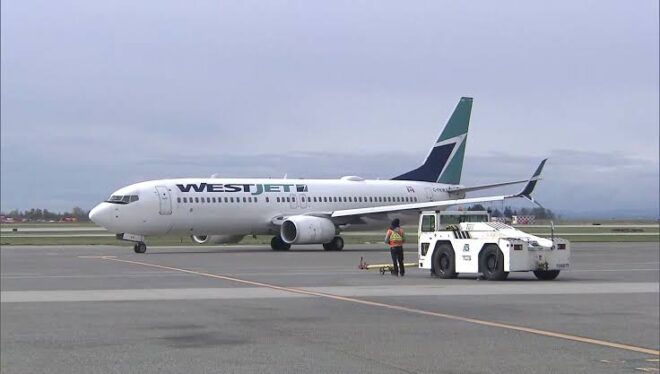
WestJet, Canada’s second-largest airline, has announced a significant expansion of its fleet with the acquisition of new Boeing aircraft. This move comes as a strategic response to the increasing demand across its network, signaling a robust recovery in the aviation sector and WestJet’s ambition to strengthen its market position.
The Calgary-based carrier has placed an order for a mix of Boeing 737 MAX and 787 Dreamliner aircraft, demonstrating its commitment to modernizing its fleet and enhancing its capacity to serve both domestic and international routes. This expansion is expected to not only meet the growing passenger demand but also improve fuel efficiency and reduce the airline’s carbon footprint.
WestJet’s Chief Executive Officer, Alexis von Hoensbroech, stated, “This fleet expansion marks a pivotal moment in WestJet’s history. As we witness a surge in travel demand across our network, it’s crucial that we position ourselves to meet and exceed our customers’ expectations. These new aircraft will allow us to do just that, while also advancing our sustainability goals.”
The order includes a substantial number of Boeing 737 MAX aircraft, which will primarily serve WestJet’s domestic and transborder routes. The 737 MAX, despite its controversial history, has proven to be a fuel-efficient and reliable workhorse for many airlines since its return to service. WestJet’s confidence in the aircraft underscores Boeing’s efforts to restore trust in the model.
Additionally, the airline has opted to expand its widebody fleet with more Boeing 787 Dreamliners. These long-haul aircraft will enable WestJet to enhance its international presence, potentially opening up new routes to Europe, Asia, and beyond. The Dreamliner’s fuel efficiency and passenger comfort features align well with WestJet’s commitment to providing a superior travel experience while maintaining operational efficiency.
This fleet expansion comes at a time when the global aviation industry is rebounding from the devastating impact of the COVID-19 pandemic. As travel restrictions ease and passenger confidence returns, airlines worldwide are seeing a significant uptick in bookings. WestJet’s move to expand its fleet is a clear indication that the carrier anticipates this trend to continue and is positioning itself to capitalize on the growing market demand.
The decision to invest in new aircraft also reflects WestJet’s long-term strategy to compete more effectively with its main rival, Air Canada. By expanding its fleet, WestJet aims to increase its market share and offer more frequent flights on popular routes, thereby enhancing its appeal to both leisure and business travelers.
Industry analysts have praised WestJet’s decision, noting that the timing of the fleet expansion could give the airline a competitive edge. As many carriers are still recovering from the financial impact of the pandemic, WestJet’s proactive approach in fleet renewal and expansion could set it apart in the market.
The new aircraft will also play a crucial role in WestJet’s sustainability initiatives. Both the 737 MAX and the 787 Dreamliner boast significant improvements in fuel efficiency compared to their predecessors. This aligns with the airline’s commitment to reducing its environmental impact and contributes to the broader industry goal of achieving net-zero carbon emissions by 2050.
WestJet’s pilots and crew members have expressed excitement about the fleet expansion. The introduction of new aircraft types often brings opportunities for career advancement and skill development within the organization. The airline has announced plans to ramp up its training programs to ensure a smooth integration of the new aircraft into its operations.
The economic impact of this fleet expansion extends beyond WestJet itself. The increased capacity is expected to create new jobs, not only within the airline but also in related sectors such as airport services, maintenance, and tourism. Cities served by WestJet are likely to see increased connectivity, potentially boosting local economies through enhanced business and leisure travel opportunities.
However, the expansion is not without its challenges. The aviation industry continues to face issues such as pilot shortages, rising fuel costs, and potential economic uncertainties. WestJet will need to navigate these challenges carefully to ensure that its ambitious expansion plans yield the desired results.
The airline has also hinted at potential network changes to complement its fleet expansion. While specific route announcements are yet to be made, industry insiders speculate that WestJet may be eyeing underserved markets or considering increased frequencies on popular routes. The flexibility offered by the new aircraft will allow the airline to optimize its network strategy in response to evolving market demands.
Passengers can expect to see gradual changes as the new aircraft are integrated into WestJet’s fleet over the coming years. The airline has emphasized that the customer experience will be at the forefront of its expansion plans, with improved in-flight amenities, enhanced connectivity, and more non-stop options to desired destinations.
As part of its fleet renewal strategy, WestJet is also planning to phase out some of its older, less efficient aircraft. This transition will be managed carefully to ensure minimal disruption to the airline’s operations while maximizing the benefits of the new, more advanced aircraft.
The financial details of the aircraft order have not been fully disclosed, but it represents a significant investment for WestJet. The airline’s leadership has expressed confidence that the long-term benefits of the fleet expansion will far outweigh the initial capital expenditure, positioning WestJet for sustainable growth in the years to come.
In conclusion, WestJet’s decision to expand its fleet with new Boeing aircraft is a bold move that reflects the airline’s confidence in the future of air travel and its own growth prospects. As the aviation industry continues to evolve in the post-pandemic era, WestJet’s fleet expansion strategy positions it to meet the increasing network demand, enhance its competitive stance, and contribute to a more sustainable future for air travel. The coming years will be crucial as the airline works to integrate these new aircraft and realize the full potential of its expanded fleet.